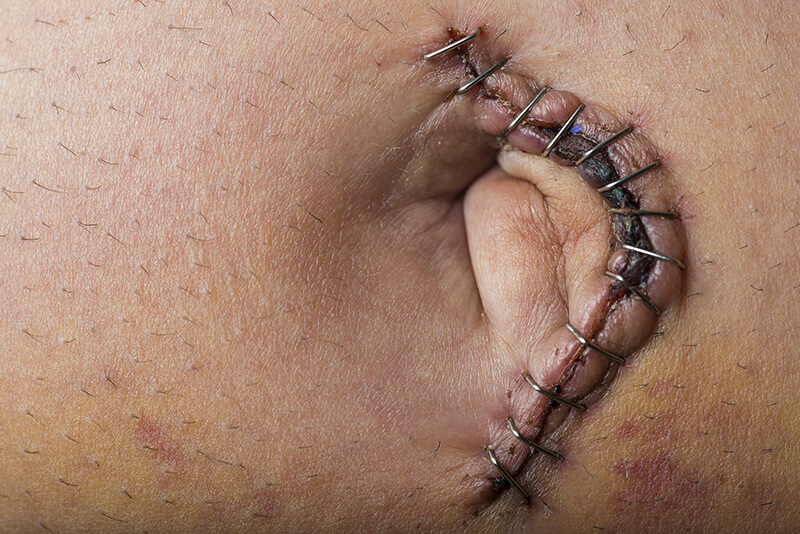Umbilical hernias are common and occur in 10 to 20 percent of all children in the US. It is a medical condition that occurs at the umbilicus when a loop of the intestine pushes through the umbilical ring.
Healthcare providers diagnose umbilical hernia during the physical examination of the abdomen. They are harmless, but if left untreated they can grow and become painful over time. Umbilical hernia can be treated and repaired through surgery. Accurate documentation using ICD-10 and CPT codes is essential for effective revenue cycle management. A medical coding company can ensure that the treatment rendered is appropriately coded so that your medical claims are reimbursed in a time-bound manner.
ICD 10 Codes to Report Umbilical Hernia
- K42: Umbilical hernia
- K42.0: Umbilical hernia with obstruction, without gangrene
- K42.1: Umbilical hernia with gangrene
- K42.9: Umbilical hernia without obstruction or gangrene
CPT Codes to Report Umbilical Hernia
Open hernia repair
- 49491: Repair, initial inguinal hernia, preterm infant (younger than 37 weeks gestation at birth), performed from birth up to 50 weeks postconception age, with or without hydrocelectomy; reducible
- 49492: Repair, initial inguinal hernia, preterm infant (younger than 37 weeks gestation at birth), performed from birth up to 50 weeks postconception age, with or without hydrocelectomy; incarcerated or strangulated.
- 49495: Repair, initial inguinal hernia, full term infant younger than age 6 months, or preterm infant older than 50 weeks postconception age and younger than age 6 months at the time of surgery, with or without hydrocelectomy; reducible
- 49496: Repair, initial inguinal hernia, full term infant younger than age 6 months, or preterm infant older than 50 weeks postconception age and younger than age 6 months at the time of surgery, with or without hydrocelectomy, incarcerated or strangulated
- 49500: Repair initial inguinal hernia, age 6 months to younger than 5 years, with or without hydrocelectomy; reducible
- 49501: Repair initial inguinal hernia, age 6 months to younger than 5 years, with or without hydrocelectomy, incarcerated or strangulated
- 49505: Repair initial inguinal hernia, age 5 years or older; reducible
- 49507: Repair initial inguinal hernia, age 5 years or older; incarcerated or strangulated
- 49520: Repair recurrent inguinal hernia, any age; reducible
Laparoscopic hernia repair
- 49650: Laparoscopy, surgical; repair initial inguinal hernia
- 49651: Laparoscopy, surgical; repair recurrent inguinal hernia
- 49652: Laparoscopy, surgical, repair, ventral, umbilical, spigelian or epigastric hernia (includes mesh insertion, when performed); reducible
- 49653: Laparoscopy, surgical, repair, ventral, umbilical, spigelian or epigastric hernia (includes mesh insertion, when important); incarcerated or strangulated
Additional codes related to hernia repair
- 15734: Muscle, myocutaneous, or fasciocutaneous flap; trunk
- 20680: Removal of implant; deep (e.g., buried wire, pin, screw, metal band, nail, rod or plate)
- +49568: Implantation of mesh or other prosthesis for open incisional or ventral hernia repair or mesh for closure of debridement for necrotizing soft tissue infection (List separately in addition to code for the incisional or ventral hernia repair)
- 49659: Unlisted laparoscopy procedure, hernioplasty, herniorrhaphy, herniotomy
- 49999: Unlisted procedure, abdomen, peritoneum and omentum
Medical coding outsourcing can ease the complex task of coding umbilical hernia repair. This can enable healthcare providers to focus on delivering exceptional patient care.




